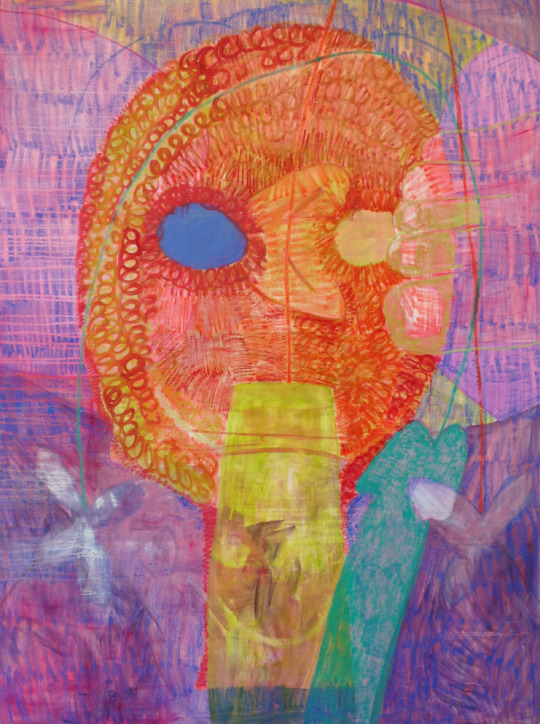
Stories of Self is a(n approximately) monthly essay series by Scott F. Parker that explores the nature of the composed self through conversations with memoirists, theorists, artists, and possibly musicians.
I Am Who I Am with Marya Hornbacher
Marya Hornbacher’s first book, Wasted: A Memoir of Anorexia and Bulimia, opens with an epigraph from Nietzsche’s Thus Spoke Zarathustra: “The awakened and knowing say: body I am entirely, and nothing else; and soul is only a word for something about the body.” It’s a provocative way to begin a book about eating disorder, which we might be inclined to think of in starkly dualistic terms: the body under attack by something—call it mind, call it soul—distinctly nonphysical.
What Hornbacher borrows from Nietzsche shows the true menace of the illness: the attack is self-reflexive.
Treating the person as a whole, rather than as separate mind and body only circumstantially localized, I see in eating disorders the kind of unstable paradox that invites my reflection on memoir—the foggy notions of self personified, literalized.
After reading Marya Hornbacher’s memoir Madness: A Bipolar Life as well as Wasted, I wrote to ask for an interview. She suggested we meet at Spyhouse, a coffee shop only a block from my apartment. At the cafe I saw a woman seated at an outside table along busy Hennepin Avenue wrapped in flowing fabric against the autumn wind and the building’s shade. Her short, layered hair resembled the author’s photo of Madness, but because she was engaged in close conversation with the man across the table from her, I nearly didn’t stop. I hesitated just long enough for her to look up and make eye contact, at which point I said, “Marya?”
She offered her hand and said, “We didn’t know how we’d recognize you.”
I wondered about her we. Was she suggesting that he would stay for the conversation? I hoped not, but after introductions he made no move to leave, so I accepted a chair and sat down. Only later, replaying the scene in my mind, did it occur to me that he was there to assess the safety of leaving Marya in my company. He left after a few minutes.
Sitting across from me, Marya looked comfortable and softer, less combustible, than the image I took from her books. An iced coffee and a pack of Camels were on the table in front of her. I had wanted to start with general questions about the memoir form, but as I made small talk and began to introduce the subject she jumped in and was off and running.
“There are so many things you hesitate to say about memoir,“ she said, waving a cigarette “Do you mind if I smoke? But it’s not an easy experience, writing and then living one down. There wasn’t a lot of research on the impact of memoir on readership. There was a surge right around the time I wrote Wasted. Elizabeth Wurtzel in Prozac Nation, myself, Kathryn Harris’s The Kiss. It all got very overblown. A lot of press around those books had nothing to do with the books and certainly nothing to do with the people who wrote them.”
“You mean that idea that memoir was going to ruin literature,” I said.
“Memoir was going to ruin the world and ruin all fidelity to truth and objectivity. Journalism students always ask me about truth in nonfiction. What about truth in nonfiction? There’s fiction and then there’s nonfiction. How do you adhere to nonfiction fully? You don’t make it up! It’s not slippery. But I’m very old school on that front.”
Old school, yes, but it’s an issue that doesn’t fade. The story isn’t what happened; it’s the meaning a person takes from what happened. Hornbacher’s memoirs are fairly straightforward. Each is an account of its subtitular conditions. Wasted reads like there was a part of the author that wanted to write in the third-person and limit the scope to research and reporting.
“What the book became is almost entirely a marketing and packaging thing. I wanted to write an academic book on feminism and eating disorders. I did not want to write a memoir. I was one of the people who thought memoir was going to ruin literary futures. You gotta remember when I sold that book I was twenty-one. It came out when I was twenty-three. They were packaging things very carefully and the Train Wreck Girl was a trend.
“And you have to remember this was the nineties. It was like Monopoly money. Not just the advances but the marketing budgets for these things were catastrophic. It wasn’t about ‘Let’s buy your book because we think it’s a good book.’ It was very much, ‘Do you have star potential? Do you fit the character we like? Are you a character we can make?’ I knew they were buying my career and I remember thinking, ‘I hope I can follow this fucker up.’ I’ve been standing in the shadow of that figure for twenty years. It is invented. Standing on the cover glaring out at the world on two books, it’s an invention of marketing people and they’re very good. They market a persona. Being a brash young woman is not hard when you’re a brash young woman.
“I was reluctant, I think because I had a sense that what did happen might happen. But when you’re twenty-two, you don’t know that. You know you’re living in a shoebox made out of particleboard in Santa Rosa, California. You’re living on Gallo wine and crackers and you’re a starving fledgling writer. And somebody says, ‘Hey, we want to buy your career.’ And you think, ‘Whew, now I can write for the rest of my life.’”
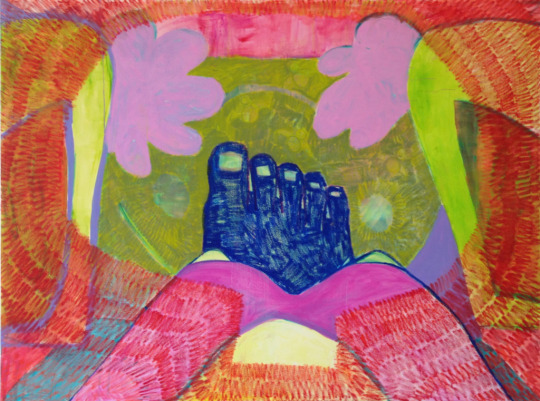
Annie Miller, Tada. 2015. Oil and oil pastel on canvas, 72in x 96in.
One question in buying the career of a memoirist, is exactly what is being acquired: the story or the storyteller? Publishers who build marketing campaigns around persona invest in the former, but the latter produces the work and can’t be reduced to its counterpart.
“Everybody’s concern was that memoir was all about me, me, me, me, me. Memoir was just a thread of self-reflection.”
But really there is no self in isolation; it is always triangulated. Even in the extreme case of Descartes alone in his chamber, the self is understood in relation to perception and cognition. What would it even mean to write only about the self?
The subject of Wasted relates to the sine qua non of memoir: the story of the self in time. For Hornbacher, anorexia manifests as pathological control against uncertainty or insecurity. The self tries to assert itself absolutely against the outside world, including especially one’s own body. The impulse in some memoir to shape the self in retrospect and provide it with a kind of permanence that’s lacking in a world that threatens to reset at every moment.
In a way, Hornbacher’s memoir can complete the task that anorexia attempts: the final dominance of the subject over the world. Each is a totalizing gesture. And each is self-defeating. Anorexia triumphs only in death, the final erasure of body. Memoir is complete only when it achieves the present. The period at the end of the perfect memoir can only be the bullet through the head.
At least that’s one way to see it. I asked Hornbacher if she saw a connection between anorexia and memoir as forms of control.
“I think there is a relationship between mastering one’s body and mastering one’s story by telling it. People have asked if Wasted and Madness were cathartic. For one thing, it’s a ridiculous notion that talking about yourself is straight up cathartic no matter how you do it. Writing Madness allowed me to sequentialize memories that felt like they had no causal relationship. And then I could see the cause and effect—of course that’s a narrative structuring of your own experience. And suddenly it makes more sense than it used to. Okay, but was the book therefore a corrective to a senseless process? Wasted was that. It was trying to make sense of what I’d done, how I’d lived. There is an element of trying to contain it or master it.”
Writing replaces memories. If you get the story right; in effect, you get the life right. A chance to live again and forever.
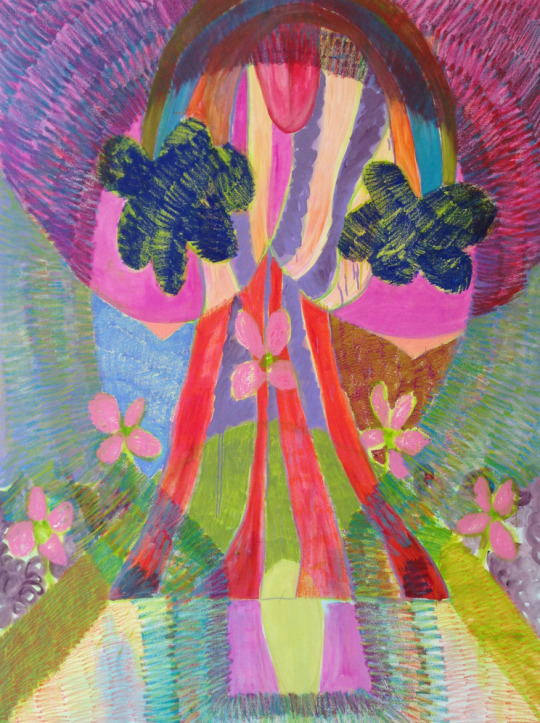
Annie Miller, Rainbow Tits. 2015. Oil and oil stick on canvas, 96in x 72in.
Memoir is always a reframe. And it always justifies its own existence. To use Virginia Woolf’s language from Moments of Being, the I-then becomes the I-now, who is capable of this telling. Memoirs show us change and maybe even the act of writing, too. But Wasted has no conclusion and frustrates the reader’s expectations of narrative closure.
“I got to the end and I didn’t know how to end it so I wrote down, ‘I don’t have an end to this story.’ And I think that was very much a stubborn resistance to the narrative impulse around ED. ‘I was young. I got sick. I got better. Now I’m a grownup. Life goes on.’ And it’s not just a genre trope, it’s everybody’s expectation of ‘what happened? now what?’ The before/after expectation. There’s that element of I have no idea what comes next in life.”
This frustration challenges the received notion of ED narrative, and possibly self-narrative more generally: “My story was the same as everyone else’s. Eating disorder memoirs resemble each other because the experience is similar, and that’s why I wrote Wasted—the experience is so similar and no one was talking about it. That’s had its own problems in the fallout.
“I didn’t necessarily want to go back and deal with me pissed off bratty teenager when I’d only just gotten rid of her. It’s the reason—it’s one reason—I don’t reread it now.”
“And what if you wrote it now,” I asked. “How would that period of your life be different accessed from your present memory?”
“I think I would be more empathetic. I think the ability of a twenty-two-year-old to be empathetic to an eighteen-year-old is limited, but the ability of someone who’s old enough to be her mother is greater. I would probably infuse more cultural research. It was infused as I knew how to make it at the time, and as culturally oriented as my editors were going to allow it to be. It’d be less angry, gentler. Things do amuse me now as they did then, but now they’re not so bitter.”
It’s a weird tangle of time, who a person is and how she understands herself. Not only was Hornbacher saying that she had changed since writing Wasted, but now she was telling me that her past itself had already changed. Every time a person revisits the past it’s the discovery of a new past, written in a new present by a new author. We are not the authors of ourselves, but we are the authors of our interpretations.
“There’s that wonderful Didion line, ‘We tell ourselves stories in order to live.’ I don’t know that we only tell ourselves stories, we also tell stories of ourselves in order to live, to give ourselves a shape, and to give ourselves a character.
“I think there’s a great deal more chance that goes into a life than an actual through line. It’s one of the reasons we need a through line in a story. Because then it makes sense. Our lives don’t. I think memoir is inherently flawed. Meaning comes retroactively. While I’m here I don’t know what this moment means until I see it a year from now and I go, ‘Oh, that’s what that was.’”
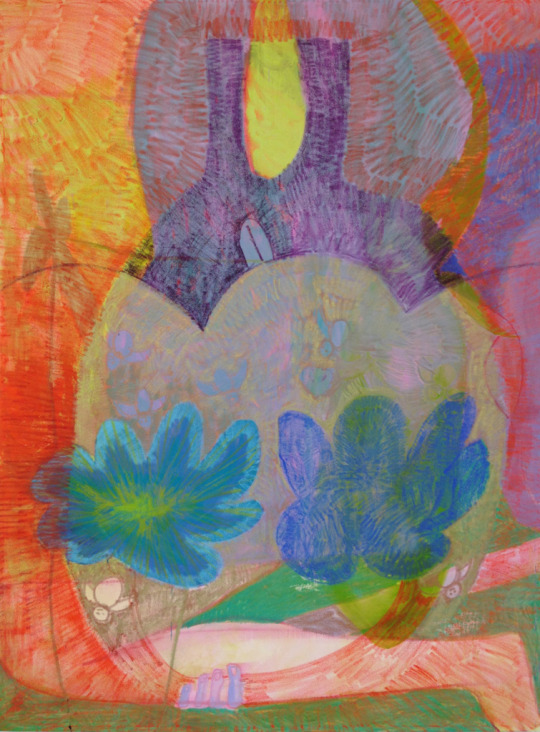
Annie Miller, Sunrise (Cloud Butt). 2015. Oil and oil pastel on canvas, 72in x 96in.
Reading her memoirs, you wouldn’t know recovery is part of Hornbacher’s life. And she doesn’t come across, in writing or in person, as religious.
“The god thing in a 12-step program has always been annoying to me because I don’t believe in god. Being told by a large group of people that there is a god and I better find it or I’m really fucked is tiresome in the extreme. The only way I’ve been able to stay in a program is by removing the need for a deity.
“Spirituality for me is really about practice. It’s Kierkegaard who said prayer does not change god but it changes the man who prays. And that’s how I look at it. We can shout and stamp our feet all we want, but it isn’t going to be significant so we might as well practice living here.”
Hornbacher doesn’t have much truck with metaphysics. There’s a line near the end of Madness where Hornbacher writes that she doesn’t regret having bipolar. To my way of thinking this makes perfect sense. There’s no appeal to things that are not the case that does not undermine the existence in question. No essential self independent of the experience of the self. For her, it’s more personal: “It’s like saying what is your brain like if you didn’t have your life? It isn’t your brain anymore. It’s a totally different physiological and philosophical thing. There’s no extricating experience from body and body from experience. That’s what’s cool about brains.” From Kierkegaard back to Nietzsche, the self for Hornbacher seems to have a strongly material basis.
“You take out any bit and we’re something else totally. I don’t think there’s a core to us. This goes back to, if you take the illness out of the brain, what is the brain and what does it do? Unfortunately, if I don’t have bipolar I might not be as creative. That’s not the madness and genius bullshit. I’m talking about, genetically speaking, they cluster. So if I didn’t have the bipolar, who would I be? I don’t know. It’s all the same brain. It’s a stew of stuff. So the idea of an intact, integrated, singular self is one I can’t buy, which may be why I resist narrative endings in memoir. Because I don’t think there is a singular self you can pluck the disorder out of you.”
“So, then,” I asked, “is the self a kind of project or something you just have depending on the physical and experiential conditions of your life?”
“I think it is not as purposeful as project implies. I don’t think we have the ability to so totally detach from our own experience to look at ourselves and be like ‘this is my project.’ We always have that lack of insight into who we are. What is the self we’re creating? I can work day in, day out to become this person and there’s this part of me over here I can’t even see that keeps ruining my plan as to what self I want to be. I think memoir is particularly frustrating because of its insistence on a narrative character, a singular voice who is telling this story. Well, I assure you, the two people who wrote my memoirs are no longer here at this table. I’m several iterations distant from them.”
Yet there’s some agency over the iterations.
“I do think we have a responsibility to keep developing the one we can see. I can’t go back and change my seven-year-old self, much as I would like to. But who I am now is not who I would have projected forward that I was going to be. I wouldn’t have anticipated becoming someone I like, for example. That wasn’t on my list of things to do. I didn’t even conceive of it as a possibility. I think it stays so relevant that we continue needing to develop in the here and now, less in detaching and objectifying the self, which memoir does, and more a changing of the experience of being a self. I think it’s much better for us to exist than to write about existing. Those of us who write have to do both because we can’t help it. But memoir cuts across a lot of those lines and makes it impossible to fully experience your experience.”
If this last claim is true, it’s sad. And even if it’s not, it goes some way to explaining Hornbacher’s ongoing antagonism with the form. What she’s describing is a debilitating self-consciousness, the kind that might obtain when a writerly self-awareness becomes recursive and pathological. If you’ve ever looked down that tunnel, you know the catatonia at the other end. But if you’ve passed by the tunnel’s opening and kept moving, you know it’s possible to temper your reflection and put at least some of your attention to the life you’re living, of which thought is only a part.
After our conversation, I read Waiting. Hornbacher writes about the 12 steps not only as way of achieving sobriety but also as a spiritual practice in their own right. Because of my interests, I read them as pertaining to memoir, and it’s telling just how easy it was to see through this lens. Memoir and spirituality are closely bound, each lending itself to journey archetypes. It has been said that there are only two kinds of stories: a stranger comes to town or a hero leaves. Memoir and spirituality belong to the latter.
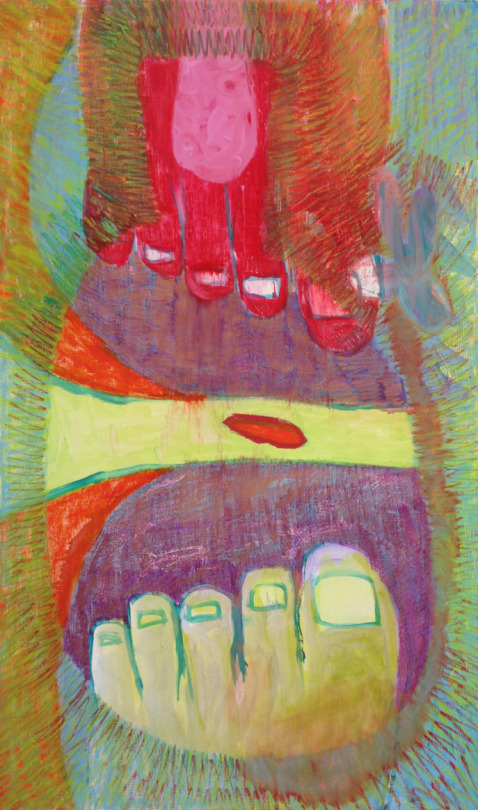
Annie Miller, TT Foot. 2015. Oil and oil pastel on canvas, 72in x 96in.
I wonder if I can bring the circle all the way around and see writing as a kind of sobriety. At first blush, writing is—or can be—an intoxicant. The vigor necessary to follow a line of thinking wherever it leads (even if nowhere), the uncommon self-confidence to listen to one’s own voice trusting that it will have something original to say, the uninhibited continuance after failure after failure. The rush of joy that sometimes follows from this effort. And, yes, the self-indulgence that is possible, the self-deception, the bluster that will embarrass you during revision. Yet the true danger of indulgence is not intoxication but dependence. And if writing sometimes proves intoxicating, its effects are more often sobering: the persistent returning to the desk, the patient and (to be redundant) sober reflection of the job. I come again to revision. Sober work, if ever there was. Language-drunk, we may be creative and prolific, but still it is in revision that we learn how to present ourselves as wiser than we are. The drunk might sometimes stumble into genius, but he’ll never know it and just as quickly he’ll stumble back out. I think of Ken Kesey here and one of the saddest assessments I’ve heard of him. Richard Scowcroft, one of his professors in grad school said, “My feeling about Kesey was that he was capable of doing the worst and the best writing of anyone in the class. And he couldn’t tell the difference.”
Writing, like spirituality, like sobriety, is a practice not a destination. Kesey, famously unsober, said late in life that if he had it to do over again he would have implemented a daily writing practice.
And how is writing not only sobering but also a spiritual practice. Hornbacher says it can be. For me, I find that when I’m working on something and I’m relatively freed of distractions, I can work on it for hours uninterrupted. There’s a selflessness involved, where the thing I’m concentrating on becomes the primary focus of my experience. The day I’m writing this, for example, I got lunch and coffee, I went for a short walk by the river, but otherwise I’ve been in the chair working. I have few needs when I’m in such a groove. Is this a spiritual experience? It is not overwhelming or ecstatic. I do not have a strong sensation currently that the world is alive with meaning. But neither am I suffering the regular pains of interiority. I’m not worried or distracted or plagued by regret or uncertain about the future. My future most certainly is uncertain, but that’s of no bother to me. I’m simply concentrated. My self, when I’m working like this, remains present but carries with it little of the suffering that usually attends. Is it a spiritual practice? What, done in the right mindset, is not? Tomorrow may be a struggle, but there’s no tomorrow today.
Volume 1: Human Contact with Patricia Weaver Francisco
Volume 2: A Tremendous Sense of Purpose with Kao Kalia Yang.




